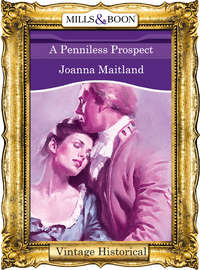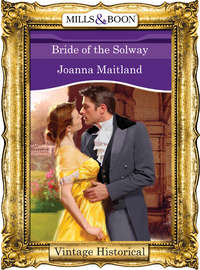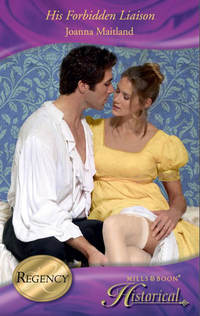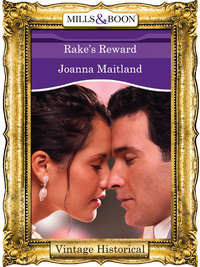
Полная версия
Marrying The Major

Emma knew she had behaved like a wanton. What would he think of her?
She turned to flee the room, but Hugo was before her.
“There is nothing to fear. Pray believe me that I would never hurt you. You have no need to run from me.”
Emma turned away. She was afraid of what she might see in his eyes.
“I will go,” Hugo said quietly. He sounded strained. “I had hoped you would come to accept me, but I can understand how difficult it must be for a beautiful young woman like you, forcibly married to such a wreck of a husband. Perhaps, in time—”
Guilt engulfed her. “You are wrong, Hugo,” she said in a low voice. “I am not afraid of you. And you are not—” In a whisper she continued, “But I am afraid of the way you make me feel.”
Marrying the Major
Joanna Maitland

www.millsandboon.co.uk
Contents
Prologue
Chapter One
Chapter Two
Chapter Three
Chapter Four
Chapter Five
Chapter Six
Chapter Seven
Chapter Eight
Chapter Nine
Chapter Ten
Chapter Eleven
Chapter Twelve
Chapter Thirteen
Chapter Fourteen
Chapter Fifteen
Chapter Sixteen
Chapter Seventeen
Chapter Eighteen
Chapter Nineteen
Chapter Twenty
Chapter Twenty-One
Chapter Twenty-Two
Chapter Twenty-Three
Chapter Twenty-Four
Chapter Twenty-Five
Epilogue
Prologue
1805
Emma Fitzwilliam settled herself high in the branches of her favourite oak, glancing only a little ruefully at yet another tear in her cotton pinafore. She was not usually so clumsy. She would be well scolded for that when she returned to the house, but her punishment would be much worse if they discovered she still climbed trees. Her old governess was still trying vainly to make a lady of her. And Papa—dearest Papa—had lately said one or two things to suggest he was less than totally happy with the way she behaved.
Dearest Papa. For him, if he asked, she would try to become a lady, but it would be terribly difficult—and terribly boring. Ladies had to walk sedately instead of romping around the estate, they were never allowed out without an escort, they certainly could not go swimming in the lake, or fishing, or climbing trees—and they weren’t even supposed to laugh out loud. Emma frowned at that last thought. Gentlemen were allowed to laugh—and frequently did—but ladies were supposed to smile demurely or, at most, give a melodious tinkle to signify amusement. It wasn’t fair. Nor would it be fair to make her spend all her time at ladylike pursuits. Emma could play and sing pretty well, and even set a neat stitch, but she could not imagine doing so all the time, with only slow, boring walks for exercise, accompanied by a stony-faced groom. Ugh.
She wriggled about until she could reach into her pocket for her book and her apple. Then she settled down to read, munching blissfully. This was one of the pleasures of not being a lady—and she would not give it up.
‘Young Lord Hardinge and his friend have called to see Miss Emma, sir,’ intoned the butler gravely from the study doorway, ‘but…no one is quite sure where she is. Shall I—?’
‘Show them both in here, Godfrey,’ said Sir Edward Fitzwilliam, rising from his deep wing-chair with a welcoming smile already on his cheery features. ‘No doubt my daughter will appear soon enough. She seems to have some kind of sixth sense about welcome visitors—and unwelcome ones, too.’ He laughed at his own wit, wondering, none the less, how it was that his mischievous daughter was never to be found except when it suited her. For Richard Hardinge, who was like a big brother to her, she probably would appear. She had been trailing him for years, after all, and Richard had never once rejected her, no matter how demanding she had become. Soon, it would all have to stop. Emma was fast maturing into a young lady—and young ladies did not cavort around the estate with male friends, no matter how trustworthy they might be, nor how indulgent her father. No—soon it would be necessary to find a proper female companion for his only daughter, to give her the polish that a young lady required, the polish that her dear mama would have provided if only she had lived.
Sir Edward sighed slightly at the sad memory, but assumed a polite smile when the door opened again to admit his two guests. The young men were remarkably alike, both tall and dark-haired, with open features and merry eyes. They seemed to have been laughing at some shared joke.
Richard Hardinge bowed politely to his host. ‘I collect we have lost her again, sir,’ he said with an ironic shake of the head. ‘And Hugo was so anxious to make his farewells in due form, too.’ Richard grinned at Hugo, who seemed to be unmoved by his friend’s sly jibe.
‘I suggest you both sit down,’ said Sir Edward placidly, nodding in the direction of the old-fashioned sofa on the opposite side of the huge fireplace. ‘She will appear, sooner or later.’ He turned to Hugo Stratton. ‘But I’m sorry to learn that you are leaving, my boy. I had understood from Lady Hardinge that you were to remain at Harding for a month or so yet.’
‘That was so, sir,’ said Hugo. ‘Lady Hardinge was kind enough to invite me to stay for the summer—until my commission came through. The thing is…well, sir, the fact is that my regiment is ordered to Deal next week—the rumour is that we are preparing for embarkation for north Germany—and unless I join them now, I’ll have to wait for months, besides missing the chance of a crack at Boney.’ His grey eyes were shining with enthusiasm as he spoke. ‘I really do have to go, you see, sir. I’m leaving for home this afternoon.’
Sir Edward nodded sagely. He had seen enough of Hugo Stratton these past few weeks to recognise the makings of a good officer in him, in spite of his youth. ‘I understand your haste, my boy. I was much the same at your age. In the circumstances, it’s good of you to make the time to call on Emma. You must have a host of more important things on your mind.’
Hugo was still young enough to be able to blush. He stammered a little. ‘After all your kind hospitality, sir, it is…the least I could do.’
‘Think nothing of it,’ said Sir Edward, ‘nothing at all.’ He rose and paced to the window, pulling back the heavy velvet curtains to gaze out on the deserted terrace and the sweeping lawns beyond. ‘Drat the girl,’ he said quietly to himself, ‘where on earth is she?’ He turned back to his guests, smiling apologetically. ‘I can understand that time is pressing for you, so I will not attempt to detain you. Since Emma has not condescended to put in an appearance, she will have to make do with second-hand farewells. I will tell her you called, and why. Perhaps now she’ll learn not to disappear quite so often.’
Hugo and Richard had risen politely with their host. Hugo took a step forward. ‘I still have half an hour, sir. May we not go and look for Miss Emma? She’s bound to be in the garden somewhere—and Richard probably knows where to look. He should, after running tame round your estate for so many years.’ This time, it was Hugo’s turn to grin at his friend’s discomfiture.
Sir Edward smiled indulgently at them. ‘Very well, if you wish. But do not, on any account, allow that little minx’s pranks to delay you beyond your time.’
The two young men were already making their way into the garden. Watching them, Sir Edward gave a weary shake of his head, ‘Heaven help me. Whatever shall I do with such a hoyden?’
Emma was so deeply immersed in the fantastic adventures of the heroine of her novel that it took several minutes before the voices penetrated her concentration. Goodness—they were standing almost directly beneath her. She offered a quick prayer that they would not look up and sat as if frozen.
‘Well, she’s clearly not here,’ said one voice with just a thread of irritation in it.
Emma immediately recognised Richard’s voice—and the annoyance. They had been fast friends almost since she was in leading strings but, of late, he was a little less indulgent than before. Her father said that Richard was now too grown-up to bother with a grubby little hoyden, that once he finished university he would have no time at all for Emma. But Richard wouldn’t do that, would he?
Emma opened her mouth to call down to Richard, but thought better of it. Someone else was with him…
‘When she doesn’t want to be found,’ said the second voice, ‘she seems to disappear into thin air. I’d have expected you to go straight to her hiding-place, Richard. After all the time you’ve spent on this estate, you should know every nook and cranny.’
Emma smiled slightly at the second voice. It was Richard’s friend Hugo Stratton, and he sounded more amused than annoyed. Hugo was not like Richard—except a little in looks, perhaps. Hugo did not treat Emma like a grubby little sister, to be teased and provoked. Hugo treated her almost like a lady.
Almost, she repeated to herself. For Hugo Stratton had a wicked sense of humour. He was quite capable of behaving like a perfect gentleman while secretly laughing at everyone around him. Only the decided glint in his eye betrayed his unholy glee—and Emma had quickly learned to look for that, before anything else.
But now, from her vantage point, all she could make out was the top of his head.
The tree shook suddenly, as if some giant had leaned heavily against it. It was only the wind, but Emma clutched at her book, loose in her lap, to prevent it from falling. She was too late to retrieve the apple core, though, which rolled down through the branches. Mercifully, it stopped, caught on a tiny twig a few feet below Emma’s perch.
‘I thought I did know all Emma’s hiding-places,’ said Richard’s voice thoughtfully, ‘but clearly not. The little brat has obviously been keeping something from me. And if we don’t find her soon, she won’t have a chance to see you before you go—and then she’ll be fizzing mad.’
‘Why should she be?’ Hugo sounded puzzled. ‘She hardly knows me.’
‘With Emma, that’s not the point. She may be only thirteen, but she believes she has a divine right to know everything about everyone round here—and to put in her two penn’orth. If you leave without saying goodbye, she’ll ring a peal over me for ignoring her.’
‘But she’s only a child—’
‘Only sometimes, Hugo. Sometimes, she sounds exactly like a Society lady. It’s uncanny—especially since she still looks like a child, all dirt and scratches and tangles.’
‘Maybe she’s growing up,’ said Hugo quietly.
‘Now, that would be a pity,’ replied Richard. ‘We’ve had such fun together. She’s a great sport, you know. Never complains about cuts and bruises, or getting wet and muddy when we go fishing. I can’t imagine her as a young lady, all prim and proper and simpering—and clean!’ He laughed aloud at that.
Emma did not pause to wonder why Hugo was leaving, for she was almost overcome by righteous anger at Richard’s words. She was not always a grubby urchin as he seemed to believe and—
And then her eyes became riveted on the apple core. The tree was moving again, almost as if it were responding to Richard’s laughter. The apple core had become half-dislodged and it was starting to slip…
She held her breath. For a long moment, there was silence.
‘I wish I were going with you, Hugo,’ said Richard, sounding suddenly very serious. ‘But with m’father the way he is…’
‘I know.’ Hugo sounded sympathetic. ‘But even if Lord Hardinge were not ailing, you still wouldn’t be permitted to go, you know. There are times when I’m really glad I’m only a younger son. And this is one of them. My mother’s brother has told me what great fun he had when he first joined the regiment. The older officers played all sorts of tricks on him of course—it’s a bit like school, in that sense—but he had such adventures…’
‘Yes, I know. You told me, remember?’ Richard was more than a little envious of his friend’s good fortune. Emma could hear it in his voice. As an only son, he would never be allowed to join the army.
‘Where on earth can she be?’ said Richard with a sudden burst of fury. ‘You go and look in the orchard, Hugo. I’ll search down by the river, but that’s it. If we don’t find her in the next ten minutes, we’ll have to go. You can’t afford to be late.’ He thumped the tree in exasperation. ‘Blast the brat. Why can she never behave?’
The apple core jumped just a fraction, hung suspended in mid-air for what seemed like seconds, and then disappeared down through the leaves.
Emma swallowed a gasp. Then, with a tiny shrug of her shoulders, she leaned towards the gap in the branches. She might as well give in gracefully. They were bound to find her now.
But Richard had gone, striding angrily across the lawn in the direction of the river.
Down below her, a sudden shout of laughter was quickly stifled. Hugo’s voice, rippling with amusement, said quite clearly, ‘Now, that is strange. My education must have been sadly at fault. I’d have sworn that this was an oak tree, but it’s obviously an apple. Unless this is an oak-apple… Yes, that must be it. And the teeth-marks must have been made by a…a squirrel, I suppose. Very large squirrels they have on this estate. Next time, I’ll bring my gun…’
Emma could have sworn she saw a flash of white teeth through the leaves. The next moment, Hugo was sprinting across the grass to the orchard, without once looking back.
She stuffed her book into her pocket and began to climb down, automatically finding the well-known footholds. Little brat, was she? Never clean? Well, she would show Richard Hardinge.
She raced across the lawn to the side door, raging inwardly all the while. With Nurse’s help, she would be clean and ladylike in a trice—well, ten minutes, at most. She would appear as a prim, proper—and demure—young lady. She’d show him…them.
No. That wasn’t fair. Hugo Stratton had not called her a grimy brat. Hugo had known perfectly well where she was, but he had just laughed—and flashed that wonderful smile…
Chapter One
1816
Emma Fitzwilliam slowed her chestnut mare to a relatively sedate trot just before she came in sight of the lodge gates. It was bad enough that she had ridden out without her groom. No need to make matters worse by galloping into the Harding estate like a mannerless hoyden.
She patted her blonde hair into place. Time to assume the role of the perfect lady—the role that she had long since learnt to don as easily as a pair of fine silk stockings.
Emma was longing to see Richard and his wife again. It was only a few months since the Earl and Countess Hardinge had left England for the Continent but, to Emma, it seemed like years. Surprisingly, given that Richard had been her childhood friend, it was his wife, nicknamed Jamie, whom Emma had really missed. The two women had become as close as sisters since Jamie’s marriage. Letters had been exchanged, naturally, but that always meant delay; communications with France remained, at best, uncertain, even though the war had been over for nearly a year and Napoleon was now safely installed on St Helena.
There was nothing like a long, comfortable coze—and that was precisely why Emma had come.
She urged her mare to slightly greater speed.
As she rounded the corner of the house, Emma saw a little group of figures sitting on the lawn under the ancestral oak. She started towards them, but then paused, for Jamie was not there. Two men were sitting on a rug with a very small child, much hampered by his petticoats. Goodness, how Dickon had grown. Emma barely recognised her little godson. He must be nigh on a year old by now.
Dickon’s anxious nursemaid was hovering as close as she dared, watching lest the clumsy males should mishandle her charge. Not much chance of that in Richard’s case, Emma thought, for he doted on Dickon and spent much more time with his little son than most fathers did. The other gentleman, however, seemed not to have noticed the child. He was half-turned away, apparently gazing into the middle distance.
Emma screwed up her eyes against the glare to get a good view of the second man. She did not know him, she was sure, though she could see little more than his profile. He was dark, like Richard, but his lined face looked older and much more serious—rather austere, in fact, in Emma’s opinion. She hoped, secretly, that she would not have to meet him. It would spoil the happiness of her day to meet a man who preached at her.
At that moment, little Dickon started to toddle towards the newcomer, holding out his arms and grinning toothily. His inarticulate squeals of joy at his own prowess carried across the lawn. The nursemaid started forward, arms outstretched to catch her darling before he fell. Richard—apparently unconcerned—smiled benignly. Dickon took two more steps, rocking unsteadily from one side to the other. His precarious balance was obviously beginning to desert him; his infectious grin was turning into the quivering lip that promised a wail of disappointment.
And then the stranger turned back towards the child, bending forward to catch him and lift him high in the air. In a matter of moments, Dickon was convulsed in shrieks of delighted laughter.
When, at last, the man moved to return the child to his father, Emma caught sight of his profile once more.
She could scarce believe what she saw. Why, he was almost like a different person. Playing with Richard’s child had transformed the unknown from a harsh, forbidding man into someone much younger, someone whose face was alight with laughter and a flashing smile…and all because of one tiny child.
Emma suddenly felt as if she were eavesdropping on the visitor’s innermost thoughts. Instinctively, she urged her mare towards the house.
The door opened well before she reached it. The butler stood waiting for her, his normally impassive countenance wreathed in smiles for the young lady who had been running around the Harding estate almost since she had learned to walk. ‘Good day to you, Miss Emma. Her ladyship will be delighted to learn that you have called, I am sure. If you will just step into the blue saloon—’
‘Oh, I don’t think her ladyship would have us bother with such formality, do you, Digby?’ Emma bestowed a dazzling smile on the butler. ‘I’m sure I don’t need to be announced.’ Laying her whip and gloves on the hall table and lifting the generous skirts of her blue velvet habit with both hands, Emma started to run lightly up the stairs. ‘I assume Lady Hardinge is in her sitting room?’
‘Why, yes, ma’am,’ the butler called up to the disappearing figure, ‘but her ladyship is—’
Emma was not paying attention. She was much too keen to see her dearest friend again.
She knocked quickly and entered the Countess’s sitting room without waiting for an invitation.
Lady Hardinge was seated on the low chaise longue by the bay window, looking out across the lawn towards the oak tree. ‘Emma!’ she cried delightedly. She started to rise from her place, leaning heavily on the back to push herself up. After a second or two, she abandoned the effort and sank back into the cushions. ‘Forgive me, Emma. It is rather difficult to rise from this seat. You see—’
Emma flew across the room to embrace her friend. They hugged for a long time. Eventually, Emma stood back and said, in a voice of concern, ‘Are you unwell, Jamie, that you cannot…?’ Her words trailed into nothing as her eyes came to rest on Jamie’s middle. ‘Oh. I see,’ she said, a little uncertainly, mentally calculating the months since she had last seen her friend. ‘You did not tell me you were increasing before you left.’ Emma regretted the words as soon as they were spoken. They sounded like an accusation.
‘No,’ agreed Jamie with a somewhat tired smile. ‘I didn’t—’ she reached for Emma’s hand ‘—because I wasn’t.’
Emma looked at Jamie in disbelief. Surely she was at least six months gone?
‘The midwife in Brussels said it was twins,’ Jamie explained, ‘and, judging by how tired I feel—never mind the size of me—I think she must be right.’
‘Twins?’ Emma sat down quickly on the footstool by the chaise longue. ‘But—’
Jamie patted Emma’s hand reassuringly. ‘I know it sounds rather frightening, but I’ve had time to get used to it now. And it’s not my first, remember…’
Emma forced herself to return her friend’s smile. ‘Congratulations, Jamie. I should have said so at once, but I was so…you looked so…’
Jamie laughed. ‘Richard was at a loss for words, too, when I told him. I don’t think I’ve ever seen him look so…so stricken. I told him there was nothing to worry about. I’m as strong as a horse. And I say the same to you, Emma. Don’t worry. Please.’
Emma squeezed Jamie’s hand. ‘I promise I’ll try not to. When is it…when are they due?’
‘Ah, now, that is more difficult. In the autumn, I think, but the midwife said twins are always early, often by several weeks. So, I don’t really know. Probably not before October.’
Emma’s eyes opened wide. Jamie had sounded almost nonchalant. ‘I see,’ Emma said noncommittally. To be honest, she was not sure she really wanted to see at all. Marriage was bound to involve babies, of course, but it was such a dangerous business, besides being plaguey uncomfortable in the months before. Only a very special man would make it worth the pain and risk, in Emma’s view. Jamie and Richard were a special case—they adored each other. But to marry a man one did not love…
Emma suddenly realised she had heard not a word of what her friend was saying. She shook her head to clear her thoughts. ‘Forgive me, Jamie,’ she said. ‘I was wool-gathering. What were you saying?’
Jamie looked indulgently at her friend. ‘I was telling you about our trip. There is so much devastation, Emma, you would be horrified to see it. Houses and villages in ruins, people in rags and starving. And everywhere, mutilated men begging for a crust. We helped where we could but… Honestly, Emma, I wept sometimes at what I saw. Oh, I know we had to defeat that tyrant, but the cost was so much more than any of us could have imagined.’
Emma nodded. ‘Yes,’ she said seriously. ‘The beggars are in England now, too, and it seems that very few of us are grateful for their sacrifice. Papa said he saw several of them being driven out of town only last week. He has taken one of them on as a stable hand, but he was unable to do much for the others, unfortunately. The money he gave them will not last all that long.’
Jamie was silent for a space, thinking. ‘Your father is a good man,’ she said at last. ‘He cares for the weak.’ She looked up suddenly, her eyes alight. ‘We, too, have an extra hand in the stables now, a man to whom we owe a debt we can never repay. He helped save the life of Richard’s dearest friend. Richard was sure he was dead on the battlefield. I never told you—for Richard asked me not to speak of it—but we went to Brussels in hopes of finding the grave. Instead, we found… Well, suffice it to say that Richard is over the moon at what has happened. He says that just finding Hugo alive is more than he had dared to hope for. Against that, it matters not a whit that—’
‘Hugo? Hugo Stratton?’ cried Emma, jumping up from her stool and knocking it over in her haste to reach the door.
‘Why, yes,’ replied Jamie, puzzled. ‘You don’t know him, do you? He’s down in the garden with Richard and Dickon, but— Emma, wait!’ Jamie was again trying to lever her ungainly bulk out of the chaise longue. By the time she had regained her feet, Emma was gone.
Emma raced across the lawn, berating herself at every step. How could she have failed to recognise Hugo Stratton, the man whose wickedly smiling face had haunted her girlish dreams for months on end? The identity of the stranger had burst upon Emma like an exploding star the moment Jamie had mentioned his name…







